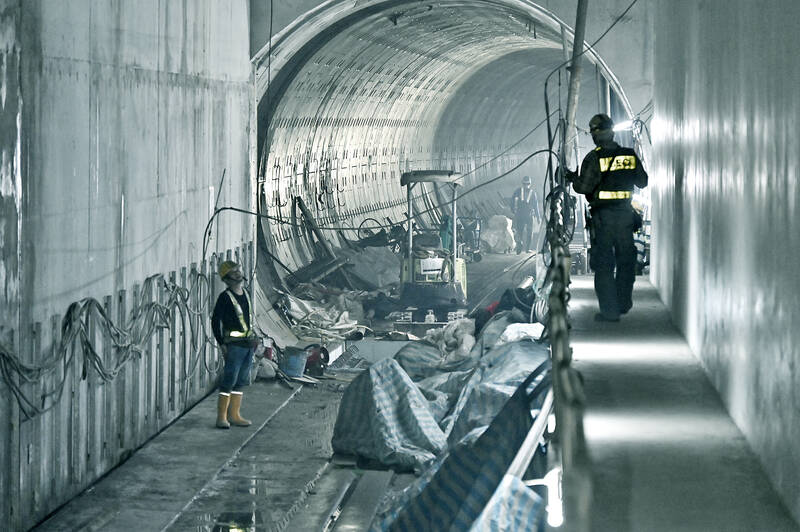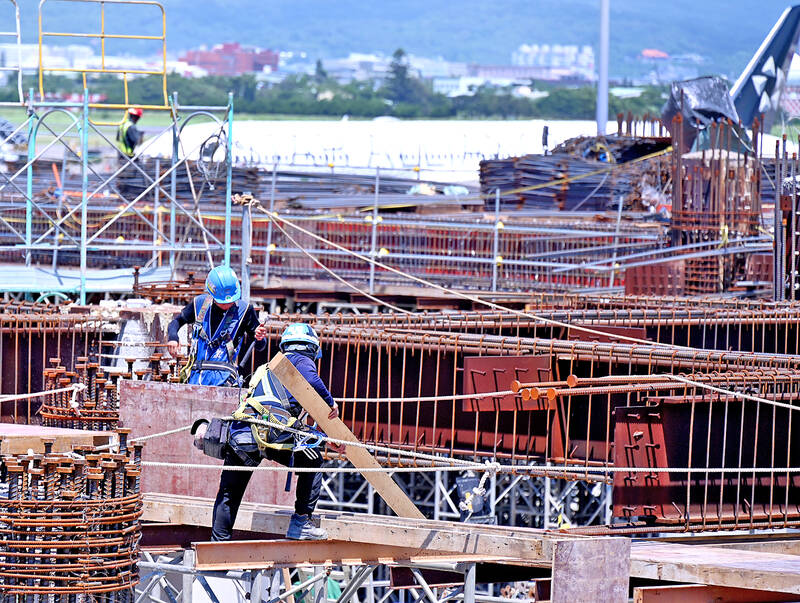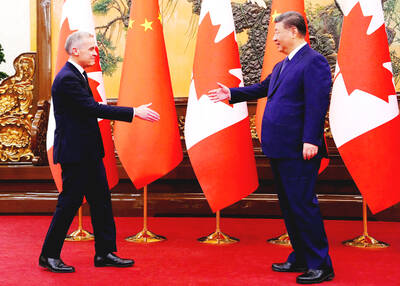In Taiwan there are two economies: the shiny high tech export economy epitomized by Taiwan Semiconductor Manufacturing Co (TSMC, 台積電) and its outsized effect on global supply chains, and the domestic economy, driven by construction and powered by flows of gravel, sand and government contracts. The latter supports the former: we can have an economy without TSMC, but we can’t have one without construction.
The labor shortage has heavily impacted public construction in Taiwan. For example, the first phase of the MRT Wanda Line in Taipei, originally slated for next year, has been pushed back to 2027. The government has invited bids for the second line, but at present firms are leery of bidding. Without a reliable supply of labor, they cannot contract for work to be done at a specific time.
IMPORTING TALENT

Photo: George Tsorng, Taipei Times
The international media, focusing on high tech, often reports on the high demand for talent in those industries. When the government speaks of importing talent, the high tech industries are often the implied context of demand, yet another way the government perceives labor importation as a way to chase status. Yet the construction industry also suffers from a profound lack of professional talent.
In its 2019 policy document Industry’s Talent Shortages: The Current Situation and Policy Response, the National Development Council (NDC) observed that 78 percent of employers in Taiwan face talent shortages. Engineers and IT technicians are hard to recruit, but many readers will be surprised to learn that those two categories follow talented sales staff as the most difficult to find, according to the NDC. The most serious shortage category of the 218,000 vacancies in 2017 was the gap of 120,000 mid-level technicians (technicians and associate professionals, craft and related trades workers and plant and machine operators). That shortage is the legacy of former president Chen Shui-bian’s (陳水扁) closure of the vocational schools that produced so much of the human capital for the miracle economy.
That trend has only accelerated. According to a Digitimes article from March, 104 Job Bank data showed 1.078 million job opportunities from 56,000 companies, “but the number of job seekers is only 595,000.” Low salaries are a major issue, but fundamentally, the demographic disaster predicted for so many years has arrived. Whatever industry one focuses on, the words “labor shortage” appear.

Photo: Chu Pei-hsiung, Taipei Times
The NDC report pointed out problems that have festered for years: poor immigration and residency systems, and low salaries. As Isabelle Cockel put it in a recent paper referring to migrant workers in Taiwan but truly describing everyone, “the developmental state of Taiwan continues to prioritize workers’ productivity over their rights.”
The NDC recommends tax abatements, though Taiwan already has one of the lowest tax takes on earth, and with an aging society higher taxes will be needed to care for the elderly. Taiwan’s Gold Card program, which brings in a tiny number of foreigners for display to the public like so many Golden Retriever puppies in a pet store window, doesn’t address the urgent problems industries face from the lack of mid-level professionals.
The construction industry faces unique demands. With factories returning to Taiwan from China demand for labor at all levels is high, but professionals in the industry are aging and leaving it and few young people are entering the industry. Parents do not want their children to enter the industry, which has a poor reputation and low social status. Government restrictions on migrant worker employment, to protect domestic employment, make it difficult to find laborers (and make employing runaways more attractive), while the Taiwan construction industry’s poor reputation in southeast Asia turns potential migrant workers off. Taiwan cannot match the pay and conditions that other countries offer.
Last July, the government finally permitted an additional 8,000 migrant workers to enter, with the potential to add another 15,000, but that will hardly begin to address the industry’s needs. It would need roughly 10 times that number to fill construction industry shortages.
Where are the young going? Consider that starting salaries for traditional jobs are around NT$30,000 a month, while food delivery starts around NT$40,000. Delivering food offers a flexible schedule, no boss, no office and, in the age of COVID-19, only fleeting contact, typically outdoors, with other people. It is easy to learn. There’s plenty of time to scroll through shorts on the phone while waiting for food. Working people of all ages, who might have gone into service jobs, are shifting to delivery.
The Internet is full of sermons on the behavior of the young, written by individuals who would never work in construction. When speakers blame culture change or lax individual morals and desire for convenience for individual choice-making, they are generally hiding a major structural crisis, in this case, of pay and working conditions.
LIMITED CHOICES
Debates about energy in Taiwan have swirled around power source choices: renewables or nuclear? Wind or solar? Geothermal? Few who discuss these issues have considered how the shape of the construction industry constrains choicemaking in the energy sector. For example, utility-scale solar development in Taiwan has been held up not only by regulatory and land acquisition issues, but also by the lack of competition in the market, according to a 2021 US-Taiwan Business Council Report.
Whether it chooses renewables or nuclear plants, the nation will need thousands of skilled workers and a robust and resilient construction industry. As with migrant labor, Taiwan competes with the global construction industry in acquiring resources such as construction sand to build energy plants at home. On-time delivery will be crucial because the government forecasts electricity demand to grow 12 percent by 2030 — which is now 5 years away (yes, like me, no doubt the reader is used to thinking of 2030 as a dim horizon, far in the future). Construction delays will further reduce Taiwan’s already thin electricity margins, and fear of delay will make firms shy about bidding on critical energy projects.
Finally, a resilient construction industry is a national security necessity. Someone has to pour the concrete for hardening Taiwan’s ports and transportation infrastructure, for creating strongpoints and missile sites. Someone has to rebuild damaged buildings. The need for maintenance and repair on transportation infrastructure alone is going to be mind-blowing. In 1944, Erhard Milch was demoted from overseeing Germany’s aircraft construction to fixing its broken transportation systems. He testified after the war that he pulled a million men out of factories just to fix the transport systems, when Germany already had 800,000 men working on repairing them.
Where will Taiwan find the skilled and experienced people it needs to keep things going, if China decides to attack? They have to be cultivated now.
The real crisis is that we’ve become inured to the labor crisis.
Notes from Central Taiwan is a column written by long-term resident Michael Turton, who provides incisive commentary informed by three decades of living in and writing about his adoptive country. The views expressed here are his own.

On a harsh winter afternoon last month, 2,000 protesters marched and chanted slogans such as “CCP out” and “Korea for Koreans” in Seoul’s popular Gangnam District. Participants — mostly students — wore caps printed with the Chinese characters for “exterminate communism” (滅共) and held banners reading “Heaven will destroy the Chinese Communist Party” (天滅中共). During the march, Park Jun-young, the leader of the protest organizer “Free University,” a conservative youth movement, who was on a hunger strike, collapsed after delivering a speech in sub-zero temperatures and was later hospitalized. Several protesters shaved their heads at the end of the demonstration. A

Google unveiled an artificial intelligence tool Wednesday that its scientists said would help unravel the mysteries of the human genome — and could one day lead to new treatments for diseases. The deep learning model AlphaGenome was hailed by outside researchers as a “breakthrough” that would let scientists study and even simulate the roots of difficult-to-treat genetic diseases. While the first complete map of the human genome in 2003 “gave us the book of life, reading it remained a challenge,” Pushmeet Kohli, vice president of research at Google DeepMind, told journalists. “We have the text,” he said, which is a sequence of

In August of 1949 American journalist Darrell Berrigan toured occupied Formosa and on Aug. 13 published “Should We Grab Formosa?” in the Saturday Evening Post. Berrigan, cataloguing the numerous horrors of corruption and looting the occupying Republic of China (ROC) was inflicting on the locals, advocated outright annexation of Taiwan by the US. He contended the islanders would welcome that. Berrigan also observed that the islanders were planning another revolt, and wrote of their “island nationalism.” The US position on Taiwan was well known there, and islanders, he said, had told him of US official statements that Taiwan had not

Britain’s Keir Starmer is the latest Western leader to thaw trade ties with China in a shift analysts say is driven by US tariff pressure and unease over US President Donald Trump’s volatile policy playbook. The prime minister’s Beijing visit this week to promote “pragmatic” co-operation comes on the heels of advances from the leaders of Canada, Ireland, France and Finland. Most were making the trip for the first time in years to refresh their partnership with the world’s second-largest economy. “There is a veritable race among European heads of government to meet with (Chinese leader) Xi Jinping (習近平),” said Hosuk Lee-Makiyama, director